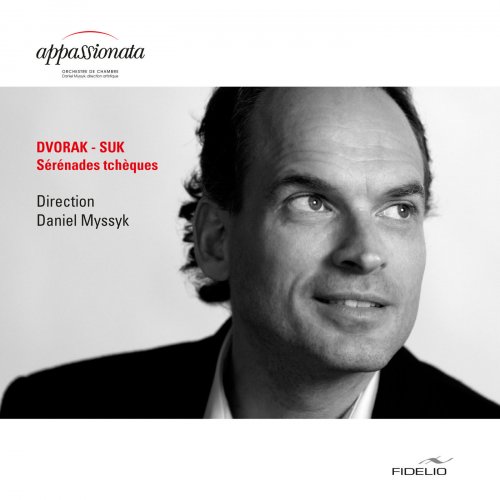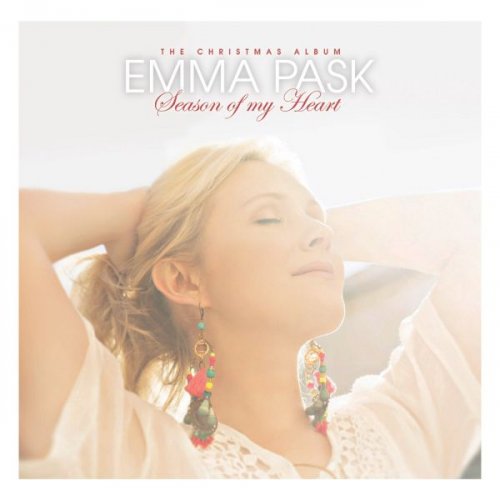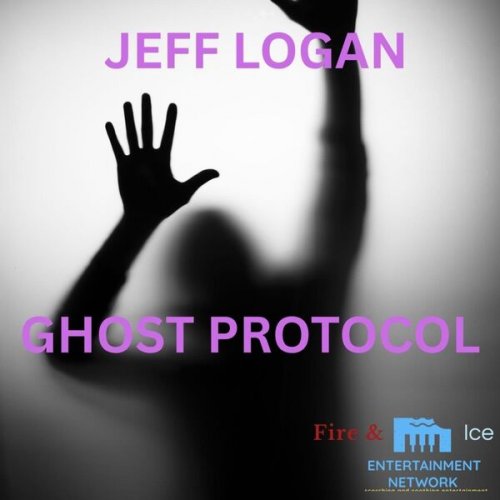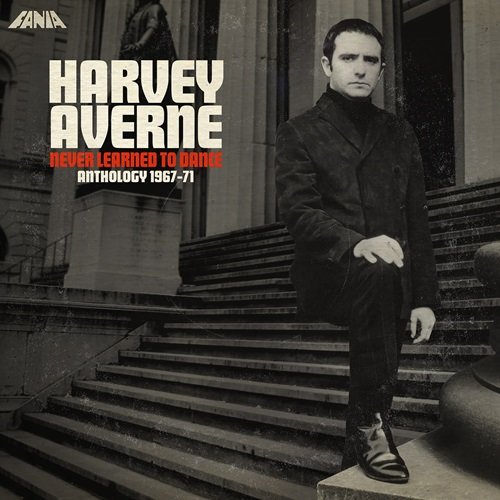Orchestre de Chambre Appassionata, Daniel Myssyk - Dvořák & Suk: Sérénades tchèques (2012) [Hi-Res]

Artist: Orchestre de Chambre Appassionata, Daniel Myssyk, Appassionata Chamber Orchestra
Title: Dvořák & Suk: Sérénades tchèques
Year Of Release: 2012
Label: Fidelio Musique
Genre: Classical
Quality: FLAC (tracks + booklet) [192kHz & 96kHz/24bit]
Total Time: 1:04:05
Total Size: 2.32 / 1.12 GB / 291 MB
WebSite: Album Preview
Tracklist:Title: Dvořák & Suk: Sérénades tchèques
Year Of Release: 2012
Label: Fidelio Musique
Genre: Classical
Quality: FLAC (tracks + booklet) [192kHz & 96kHz/24bit]
Total Time: 1:04:05
Total Size: 2.32 / 1.12 GB / 291 MB
WebSite: Album Preview
Serenade in E-Flat Major, Op. 6:
1. Antonín Dvořák – I. Moderato (04:40)
2. Antonín Dvořák – II. Tempo di valse (06:48)
3. Antonín Dvořák – III. Scherzo: Vivace (05:10)
4. Antonín Dvořák – IV. Larghetto (05:52)
5. Antonín Dvořák – V. Finale: Allegro vivace (06:09)
Serenade in E Major, Op. 22, B. 52:
6. Josef Suk – I. Andante con moto (05:05)
7. Josef Suk – II. Allegro, ma non troppo e grazioso (05:31)
8. Josef Suk – III. Adagio - Piu andante - Tempo I (09:57)
9. Josef Suk – IV. Allegro giocoso, ma non troppo presto - Vivace (07:17)
10. Antonín Dvořák – Nocturne in B major, Op. 40, B. 47 (07:40)
Described by La Presse as “impeccable in every respect,” Montreal’s exciting young chamber orchestra Appassionata presents a radiant new recording, Sérénades tchèques (Czech serenades) featuring music for string orchestra by Josef Suk and Antonin Dvořák, under the direction of its Music Director Daniel Myssyk. Praised by Radio-Canada for its “fluidity, drama and conviction,” the recording also boasts spectacular gleaming sound, due to a unique X2HD recording process by the Montreal label Fidelio. The sound on the new recording is described by Fanfare as “simply astounding … the disc opens on a soundstage of such breadth, depth, clarity, and transparency that all sense of speakers, amplifiers, and other electronics between you and the orchestra quite literally disappears. You are there.”
Following their critically-acclaimed debut recording Idyla—a 2010 Opus Prize finalist for best album—featuring music by Janáček, Appassionata and Myssyk plunge back into the Czech Romantic repertoire. Josef Suk’s joyful Serenade for Strings in E flat major, Op.6 is imbued with grace and finesse, followed by the sheer exuberance of Dvořák’s Serenade for Strings in E major, Op.22 and that composer’s intimate and haunting Nocturne for Strings in B major, Op.40. “Working and reworking these serenades, we came to believe that it is truly possible to evoke the spirit of these composers,” says Myssyk, “In our recording sessions for these great dramatic works we created a feeling of osmosis similar to that of actors who spend weeks in rehearsal before the premiere.”
The night, when our gaze turns inward, is a wondrous time for thoughts and emotions to be transformed. Will nights be filled with anguish? Will they be serene? In their serenades for strings, Antonin Dvorák and Josef Suk both chose the latter. Indeed, the original Italian word serenata literally meant “serene night” although in music, the word “serenade” designates a composition to be played outdoors in the evening, as opposed to the aubade, which was to be played in the morning. In the Romantic era, the serenade had evolved into a light instrumental genre for a limited number of instruments and, unlike the drama and intensity of the large-scale symphony, was distinguished by its simplicity and nostalgic character. This mood appropriately describes the present album which also features Dvorák’s Nocturne, a brief, expressively contiguous composition unfolding like a thought shared in all confidence and rightfully belonging in this collection of night pieces.
Following their critically-acclaimed debut recording Idyla—a 2010 Opus Prize finalist for best album—featuring music by Janáček, Appassionata and Myssyk plunge back into the Czech Romantic repertoire. Josef Suk’s joyful Serenade for Strings in E flat major, Op.6 is imbued with grace and finesse, followed by the sheer exuberance of Dvořák’s Serenade for Strings in E major, Op.22 and that composer’s intimate and haunting Nocturne for Strings in B major, Op.40. “Working and reworking these serenades, we came to believe that it is truly possible to evoke the spirit of these composers,” says Myssyk, “In our recording sessions for these great dramatic works we created a feeling of osmosis similar to that of actors who spend weeks in rehearsal before the premiere.”
The night, when our gaze turns inward, is a wondrous time for thoughts and emotions to be transformed. Will nights be filled with anguish? Will they be serene? In their serenades for strings, Antonin Dvorák and Josef Suk both chose the latter. Indeed, the original Italian word serenata literally meant “serene night” although in music, the word “serenade” designates a composition to be played outdoors in the evening, as opposed to the aubade, which was to be played in the morning. In the Romantic era, the serenade had evolved into a light instrumental genre for a limited number of instruments and, unlike the drama and intensity of the large-scale symphony, was distinguished by its simplicity and nostalgic character. This mood appropriately describes the present album which also features Dvorák’s Nocturne, a brief, expressively contiguous composition unfolding like a thought shared in all confidence and rightfully belonging in this collection of night pieces.

![VA - HDTracks 2025 Hi-Res Sampler (2025) [Hi-Res] VA - HDTracks 2025 Hi-Res Sampler (2025) [Hi-Res]](https://www.dibpic.com/uploads/posts/2025-11/1762587557_hdtracks-2025-hi-res-sampler.jpg)

![Diego Ruvidotti - Fly Poop Project (2025) [Hi-Res] Diego Ruvidotti - Fly Poop Project (2025) [Hi-Res]](https://www.dibpic.com/uploads/posts/2025-11/1762594586_gjklw2097rvia_600.jpg)

![Jerk - as night falls (2025) [Hi-Res] Jerk - as night falls (2025) [Hi-Res]](https://www.dibpic.com/uploads/posts/2025-11/1762880416_folder.jpg)
![Sophia Domancich - Wishes (2025) [Hi-Res] Sophia Domancich - Wishes (2025) [Hi-Res]](https://img.israbox.com/img/2025-11/08/dw0tlui2kq50msp76ibh4fd9a.jpg)
![Jowee Omicil - sMiLes (2025) [Hi-Res] Jowee Omicil - sMiLes (2025) [Hi-Res]](https://www.dibpic.com/uploads/posts/2025-11/1762773441_qq2v5z65j2g2b_600.jpg)
